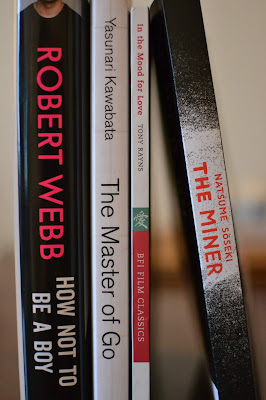(Kore-eda Hirokazu, 1999)
Speaking with Mark Schilling for Premier back in 1999 with only
"Maboroshi no Hikari", "After Life" and his documentaries
under his belt, it was clear Kore-eda was going down the route of the auteur,
though his penchant for the unconventional family drama was still some years to
come. Since 2008's seminal "Still Walking", "Air Doll"
aside (which is probably where it can stay), his work has seen weak father
figures, bickering couples, children fending for themselves and grandparents
that know best.
But with 2006's "Hana" Kore-eda's biggest step into new
territory so far with a period piece, his latest film "The Third Murder"
sees him take on the courtroom drama: a genre typically building suspense to
the inevitable plot twist reveal.
Misumi (played by hair connoisseur Koji Yakusho) confesses to the
murder of a local factory owner: his former boss. A convicted murderer on two
counts in his native Hokkaido, it comes soon after his release form his thirty
year sentence, and as such, he is likely to face the death penalty. Up steps
Shigemori (taller-than-average Masaharu Fukuyama) and his legal firm to defend
Misumi: their sole purpose to reduce his charge from murder and burglary to
murder and theft, thus potentially seeing Misumi cheat death.
Misumi, playing the sap, goes along with Shigemori's idea, but the more
Shigemori delves, the less it seems a clear, open-and-shut case.
"Links" are uncovered between Misumi and his former boss' widow and their
daughter, Sakie (our little sister Suzu Hirose) - seemingly the victim of her
father's abuse. As such, Shigemori
starts to question the true motives of Misumi, not just as a legal case,
but as to the true nature of justice.
With so many lives affected, a selection of narrative options are
offered, without giving a firm conclusion as to which was the true course of
events, leaving Shigemori questioning his role, as Misumi realises his end
goal.
Plot twists in suspense dramas compare to trying to make people jump in
horror films: they're a cover for lacking anything truly captivating to say or
show. As such, the nature of offering many potential stories could lead to a
confused mess of a film, but Kore-eda, while working in a different area, is
becoming something of a master at evaluating the human condition, using the
contradictory narratives to leave you questioning truth and motive, rather than
a simple twist at the end to try and keep you interested.
Social comment as to the justice system is offered throughout, perhaps
sometimes a little too plainly, though always aimed at the morality and ethics
of an organised justice system. Misumi may have admitted to the murder, but the
more he reveals, the less straightforward his guilt becomes. Shigemori - oft
referred to as a lawyer who keeps criminals from facing their guilt by family
and foe alike - simply deconstructs narrative to fit his case for the defence.
As with "Like Father, Like Son", the lead characters'
differences create archetypes to help Kore-eda in making his point. Shigemori,
as with Nonomiya, starts from the moral high ground, but soon realises he is
the one who needs to ask himself some searching questions. Shigemori and Misumi
hold an obvious - and sometimes literal - mirror to each other, with Fukuyama's
character again having to be the one to concede, much as Hiroshi Abe finds
himself in "Still Walking" and "After the Storm".
Stylistically, there are perhaps some more mainstream cinema staples
put to use, Kore-eda perhaps trying to take himself out of the comfort zone he
may have slipped into. Shigemori's dream sequence is somewhat out-of-the-norm,
as well as attempts at more poignant visuals to music, in an attempt to create
iconic shots. For some this may be seen as a further decline into mainstream
cinema, away from the more masterfully understated work of his first two films.
However, it could also be perceived as a bridging of a gap, with the film taking
the top awards at the Japan Academy Prizes a step in the right direction for
Japanese cinema: one of the nation's best working directors getting his just
rewards.
A legal drama, "The Third Murder" doesn't necessarily rely on
the suspense of a thriller, but still keeps you watching as to what transpires
before you. Despite some differences, this is very much a Kore-eda film: Shigemori,
Misumi and Misumi's victim all play the role of weak father figures, with
Shigemori's father the grandfather with greater knowledge. No easy solutions
are offered, with greater happiness found away from one's initial objectives.
The "face-to-face" scene between Shigemori and Misumi towards
the film's end offers some of the iconic shots perhaps aimed for, with Yakusho
cementing himself as one of Japan's all-time great actors, deserving of his
Best Supporting Actor gong at the Japan Academy Prizes. What starts off as a
seemingly bumbling, forgetful and absent-minded fool, develops into a character
of many layers. The truth is that Misumi wants to control people. By changing
his story, resulting in the outcome Shigemori fought against, Misumi, the
murderer, certainly held power over the lives of others.



